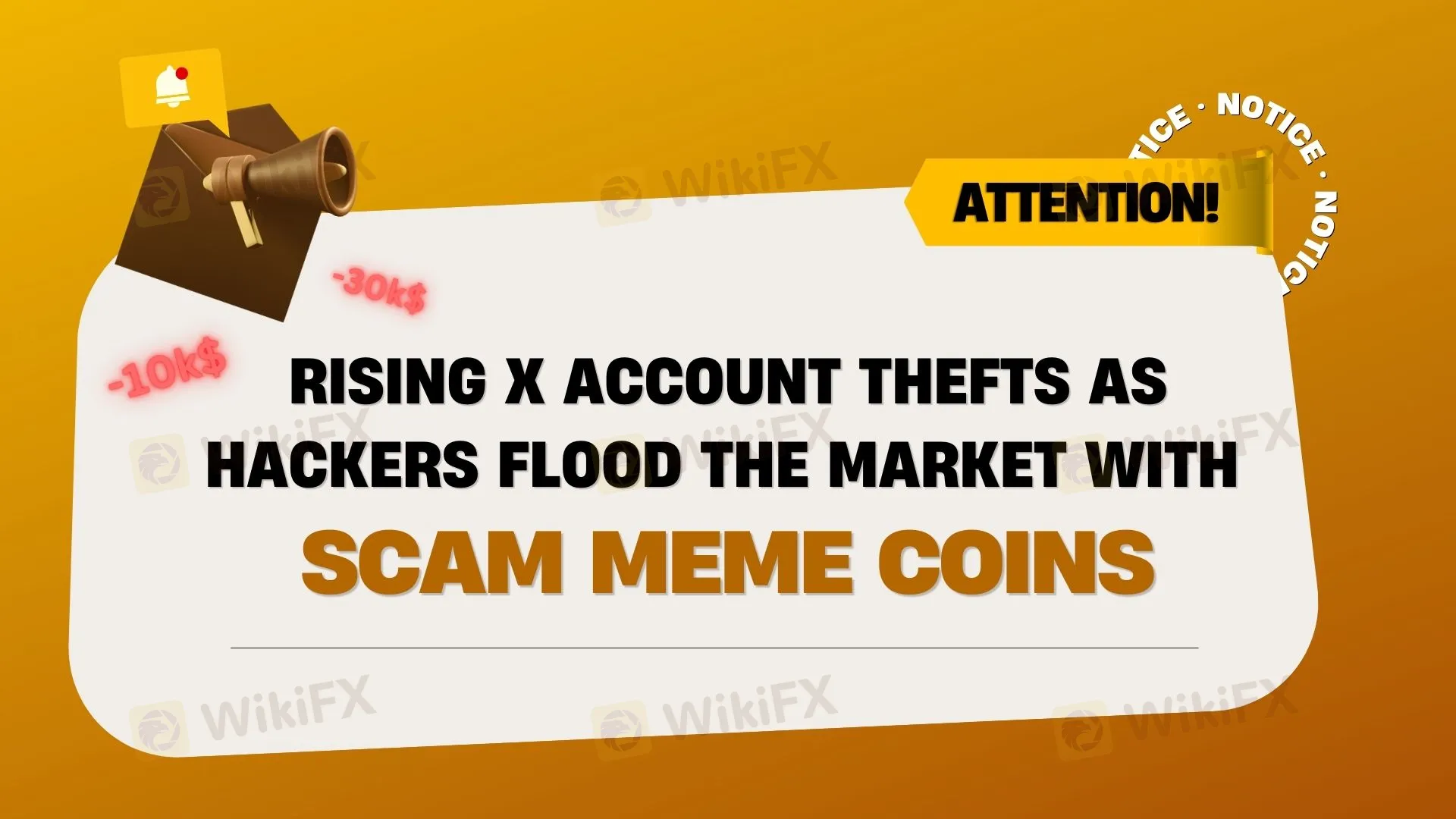简体中文
繁體中文
English
Pусский
日本語
ภาษาไทย
Tiếng Việt
Bahasa Indonesia
Español
हिन्दी
Filippiiniläinen
Français
Deutsch
Português
Türkçe
한국어
العربية
Alert! Rising X Account Thefts as Hackers Flood the Market with Scam Meme Coins
Abstract:A new scam is spreading on X, where hackers hijack celebrity accounts to promote fake meme coins, manipulate markets, and leave investors with heavy losses.

Recently, an increasing number of celebrity X (formerly Twitter) accounts have been hacked and used to promote unauthorized meme coins. These scams exploit the social influence of public figures by posting deceptive promotional videos, misleading tweets, and even using verified account markers to make fake tokens appear legitimate. Hackers create short-term hype through social media, artificially inflating meme coin prices before dumping their holdings, causing the price to crash and leaving investors with heavy losses. This trend has intensified following former President Donald Trumps meme coin launch, with hackers aggressively targeting celebrity accounts to deploy meme coins on Solana and other blockchains, fueling speculative investment frenzies.
Tanzanian Billionaire Mohammed Dewjis X Account Hacked
Hackers first gained unauthorized access to the X account of Tanzanian billionaire Mohammed Dewji and immediately began using it to promote a meme coin called $Tanzania, launched on the Solana blockchain. Dewji, the CEO of METL Group and the owner of a professional football team in Dar es Salaam, has over 2.2 million followers on X. Capitalizing on his influence, the hackers posted multiple tweets from his account, encouraging users to buy the token and providing purchase instructions.

However, these tweets were quickly deleted, suggesting that X or Dewji‘s team intervened upon detecting suspicious activity. But the hackers escalated their efforts by uploading a fabricated video through Dewji’s account. The footage showed him sitting in his home office, holding a piece of paper with “$Tanzania” handwritten on it, attempting to convince followers that he was personally endorsing the token. The video quickly gained traction, leading many investors to believe it was an official launch, prompting a buying frenzy.
Just hours later, the price of $Tanzania collapsed, resulting in significant losses for investors.
Kanye West Rejects $2M Meme Coin Scam Offer
In some cases, hackers attempt to directly bribe celebrities into promoting their scams. Recently, rapper Kanye West revealed on X that someone offered him $2 million to promote a meme coin on social media.

According to the chat records Kanye shared, the deal required him to first tweet about the token, then claim his account had been hacked eight hours later, and finally post another tweet sixteen hours later denying any affiliation with the coin. In return, he would receive a total of $2 million. The orchestrators claimed this “collaboration” could generate tens of millions in profits for them. Kanye outright rejected the offer and reiterated his disinterest in cryptocurrency.
How Can Investors Avoid Meme Coin Scams?
To counter the growing threat of these scams, investors must exercise caution and avoid falling victim to meme coin hype on social media. Key protective measures include:
1.Verify Information Sources – Always check whether a celebrity-endorsed token is officially verified through their website, X statements, or reputable blockchain data platforms.
2. Beware of “FOMO” Psychology – Hackers manipulate investor fear of missing out (FOMO) to drive impulsive token purchases.
3.Avoid Clicking Suspicious Links – Social media is filled with phishing sites; investors should avoid unverified links, especially those promising quick profits.
4.Use Reputable Exchanges – Trade only through regulated cryptocurrency exchanges and avoid third-party links recommended on social media.
5.Monitor Unusual Trading Activity – Use on-chain analysis tools to track wallet addresses, check token contracts for security, and be wary of meme coins with abnormal transaction volumes.
Disclaimer:
The views in this article only represent the author's personal views, and do not constitute investment advice on this platform. This platform does not guarantee the accuracy, completeness and timeliness of the information in the article, and will not be liable for any loss caused by the use of or reliance on the information in the article.
Read more

Exnova Forex Broker Scam: Blocked Accounts, Lost Funds
Exnova forex broker slammed for scam tactics, blocking withdrawals, and dodging regulation. Victims warn of fraud risks—steer clear!

TriumphFX Rebrands to Continue Global Fraud: Over RM80 Million Lost
The notorious forex investment company TriumphFX, previously exposed for running a global scam operation for over a decade, is now being accused of rebranding itself to continue defrauding unsuspecting investors. Despite being unregulated and based offshore in Seychelles, TriumphFX has actively targeted Malaysian investors, luring them with false promises and eventually converting funds into cryptocurrency, making recovery nearly impossible.

TriumphFX Faces 29 Exposure Reviews on WikiFX
TriumphFX faces scrutiny with 29 exposure reviews on WikiFX, revealing regulatory warnings from ID BAPPEBTI, VU VFSC, SG MAS, and MY SCM, plus user complaints about withdrawal issues and fraud concerns.

What WikiFX Found When It Looked Into Exclusive Markets
In the fast-growing world of online trading, security and regulation are essential. One company now raising questions in this space is Exclusive Markets, a broker claiming to be regulated, but scrutiny of its licence and operations suggests a more complex picture.
WikiFX Broker
Latest News
IronFX Broker Review 2025: A Comprehensive Analysis of Trustworthiness and Performance
OctaFX Flagged by Malaysian Authorities
Nonfarm Data Lifts Market Sentiment, U.S. Stocks Rebound Strongly
Interactive Brokers Enhances PortfolioAnalyst with New Features
Why Your Worst Enemy in Trading Might Be You
Errante Broker Review
Interactive Brokers Enhance Account Security with FDIC Coverage
SFC Issues Restriction Notice to GA (Int’l) Capital Management Limited Over Regulatory Concerns
Exnova Forex Broker Scam: Blocked Accounts, Lost Funds
Currency Calculator


